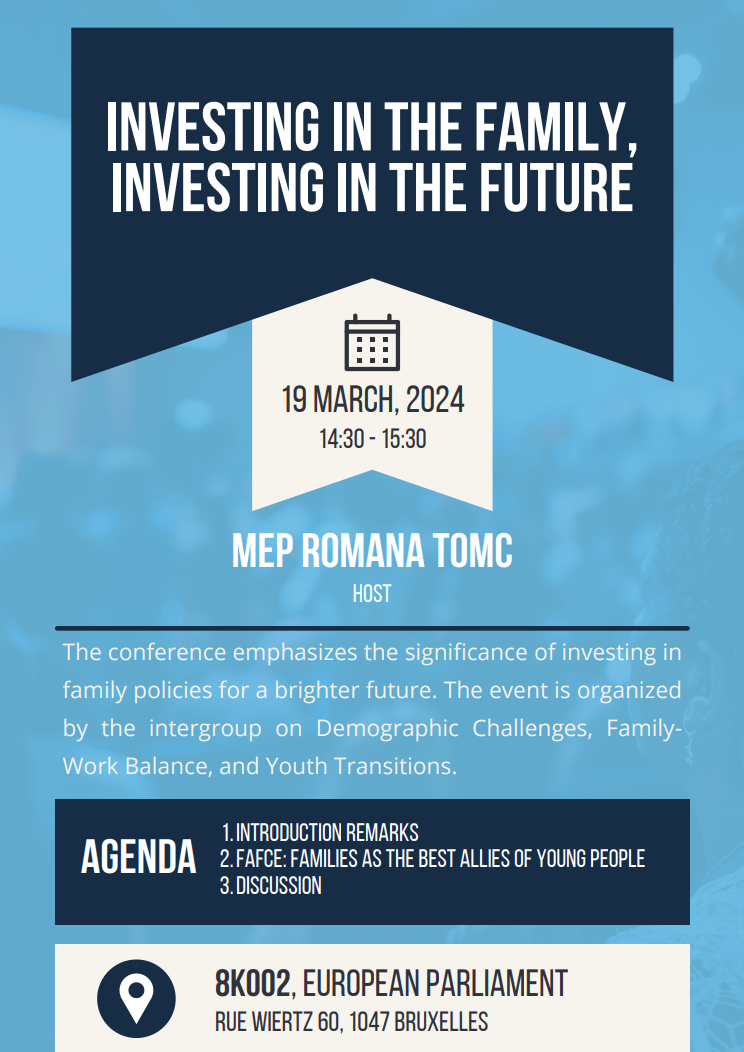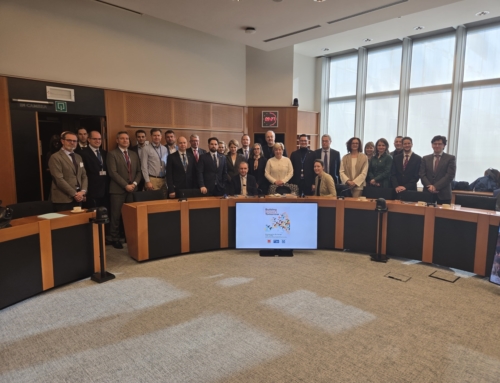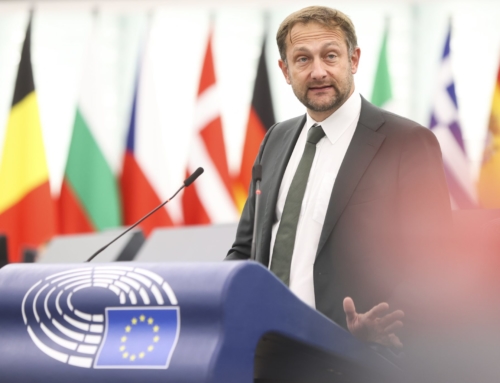Brussels, 12th March 2024
FAFCE will co-host a conference with Romana Tomc MEP entitled Investing in the Family, Investing in the Future in Brussels on Tuesday 19th March 2024.
The conference emphasizes the significance of investing in family policies for a brighter future. Romana Tomc MEP (EPP) serves as co-chair on the intergroup on Demographic Challenges, Family and Work Balance, and Youth Transition.
The conference will also feature Toma Šutić, Member of the Cabinet of the Vice President for Democracy and Demography at the European Commission.
Other speakers are expected to be announced.
The conference will consist of introductory remarks from invited speakers, a section contributed by FAFCE on Families as the best allies of young people, and will conclude with a discussion.
It will be held in Brussels at the European Parliament Room 8K002 from 14:30 to 15:30 on Tuesday 19th March 2024.
FAFCE has been focusing on the key topics highlighted by the intergroup on Demographic Challenges, Family and Work Balance, and Youth Transition
On Demographic Challenges
FAFCE has long been raising the alarms on the demographic winter, stressing in a board resolution in 2021 that “the family is the demographic and democratic future of Europe”.
In a recent comment regarding demography, Vincenzo Bassi, President of FAFCE, said: “In the context of a demographic winter in Europe and a culture of loneliness, it is the family that holds the key to intergenerational solidarity. To protect and to promote the family is to give our societies the best chance at tackling our digital, ecological, and demographic transitions.”
Reflecting on FAFCE’s involvement on the demography question in Europe, Bassi highlighted: “It is urgent to re-establish the intergenerational balance in Europe. To do so, we need to build a new paradigm to put the family at the centre of long-term public policies in Europe.
“The demographic issue concerns all, and it is appropriate, as well as necessary, to create institutional exchanges at the European and international level with the aim of promoting a new demographic spring. Family policies are a direct competence of every State. But this does not prevent them from taking initiatives by mutual agreement, across political alignments, for the exchange of good practices and for the promotion of family-friendly policies”.
On Family and Work Balance
FAFCE is a member of the European Sunday Alliance, which campaigns for a work-free Sunday and a right to disconnect. Further to this, FAFCE’s policy calls include:
- family-based taxation systems in order to prevent the unequal treatment of parents and carers
- adequate and fully paid access to maternity, paternity and parental leaves for parents, regardless of effective time worked
- full freedom to parents to decide on the division of the leave between the father and the mother
- legally recognise the right to disconnect and a work-free Sunday, as fundamental freedom of each person
- implement national action plans of the Child Guarantee
- end discrimination of women in the workplace
In a recent comment related to work and family balance, Vincenzo Bassi, FAFCE President, said: “workers cannot be viewed solely as a group of individuals, but as part of families and communities contributing to the common good. They are also often parents, husbands, wives, and sons and daughters – when we consider the rights of workers we should also consider their family responsibilities”.
On Youth Transition
FAFCE’s latest board resolution focused on Young people and mental health: families as their best allies, emphasising the need for intergenerational solidarity.
FAFCE urges European institutions and EU member states to:
- Develop a human-centred approach to mental health, focusing on the human dignity of each child, youth and their families, recognising the role of families and informal care.
- Promote a culture of life, solidarity and community, that can help the youth in fostering trust in the future, while coping with economic, social and cultural obstacles.
- Recognise the valuable work and support of grandparents in the everyday well-being of children and youth, taking care responsibilities, and transmitting hope and experience of life to the younger generations
- Undergo an in-depth analysis on the roots of mental health distress on young generations, taking into consideration the impact of digitalisation and demographic change, digital addictive behaviour, cyber violence, sexual abuse, promotion of unclear concepts regarding the so-called “gender self-determination”, no work-family balance, youth unemployment, instability of family relationships and the lack of family members commitment.
- Promote the development of National Action Plans (NAPs) to support families, family networks and associations and schools at the forefront of depression and suicide prevention initiatives, with training on detection and prevention as well as support for those who have lost someone through suicide; include parent and family associations in the development of these policies.
- Recognise digital addictions as a potential source of mental health disorders in children and youth; establish and implement targeted policies to combat the specific impact of digital addictions, drug abuse and addiction.
- Take legislative action against oversexualization of content online and in advertisement, particularly depicting children; coordinate EU Member States to collect all data regarding pornography production and consumption trends by both minors and adults.
- Take into consideration the impact of the well-being of mothers and pregnant women on the mental health of their children, also before birth, and draw attention to particular support in actions taken.
- Consider the role of sports and music activities, especially collective, and children participation as a preventive measure, and support families with difficulties to involve children through school, community or family associations programmes.
- Establish the Sunday as a weekly day of common rest, thus favouring family and social cohesion.







